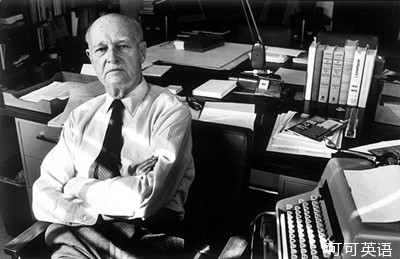Books and Arts; Book Review;History of diplomacy;Dealing with the enemy;

Three decades ago George Kennan— former American ambassador to Moscow, multilingual diplomat and conceptualiser of “containment”, the heart of his country's foreign policy towards the Soviet Union—agreed to allow an American cold-war historian, John Lewis Gaddis, to serve as his biographer. Kennan had decamped from public service to the Institute for Advanced Study in Princeton more than 20 years earlier and was already 78 years old. When he began giving Mr Gaddis interviews and stacks of personal papers in 1981, their understanding was that the biography would appear in the presumably not-too-distant future after the elder man's passing.
三十年前,喬治·凱南—前美國駐莫斯科大使,掌握多種語言的外交官,美國對蘇外交核心“遏制”政策的始作俑者—同意由美國冷戰(zhàn)歷史學(xué)者約翰·加迪斯為其撰寫傳記。那時,已78歲高齡的喬治·凱南,早退出政界在普林斯頓高級研究院從事研究已超過二十個年頭。1981年起喬治·凱南開始與約翰·加迪斯會面并給予后者大堆個人資料,兩人商定喬治·凱南的傳記將在其過世后不久的將來面世。
Decades of interviews later, Mr Gaddis, who is now 70, had become accustomed to his students “speculating sombrely about which of us might go first”. Even Kennan felt sorry for “poor John”; in 2003 he lamented the “serious burden” of his own “unnatural longevity”. It was only in 2005, when death finally claimed Kennan at the age of 101, that Mr Gaddis could begin thinking about publishing this long-awaited biography.
自兩人會面后的幾十年里,如今已古稀之年的約翰·加迪斯已經(jīng)習(xí)慣了讓他的學(xué)生們“嚴(yán)肅地預(yù)測一下我們兩個誰會先走一步“。即便是喬治·凱南也對約翰·加迪斯心懷愧疚;2003年他曾為自己的“超然長壽”帶來的“不堪重負(fù)”而悲嘆不已。2005年,101歲的喬治·凱南終于等到了生命的終點(diǎn),也是從那時起,約翰·加迪斯才可以開始考慮出版這本經(jīng)歷了漫長等待的傳記了。
The extraordinary length of the book's gestation meant that much changed between conception and publication. Had it appeared in the mid-1980s, the context would have been cold-war stalemate; in the early 1990s, celebration; a decade ago in 2001, concern about terrorism. Because “George F. Kennan: An American Life” finally arrives in the uneasy year of 2011, its context is economic misery and questions about the future of American dominance in international affairs.
這本書無與倫比的超長“妊娠期”意味著其起初構(gòu)思與最終出版之間的多次變更。在書中,80年代中期的背景主要是冷戰(zhàn)僵局;90年代早期是慶祝冷戰(zhàn)勝利;2001年之后的十年主要涉及反恐。熬到了經(jīng)歷漫長艱辛最終出版的2011年,背景則又成了經(jīng)濟(jì)困局和對美國將來是否能主導(dǎo)全球事務(wù)的疑問。
Mr Gaddis is unequivocal on this topic. He told the New York Times in 2004 that “American imperial power…h(huán)as been a remarkable force for good, for democracy, for prosperity.” He has also expressed his admiration for the former presidents, Ronald Reagan and George Bush junior, and their versions of “grand strategy”, a topic he now teaches at Yale University. All of these developments have naturally given rise to much speculation. Could Mr Gaddis, who admits that he speaks no foreign languages, get on top of the mountain of material and do credit to such an international polymath? Would his own views emerge along with Kennan's? The 784-page answer to both these questions is yes.
約翰·加迪斯對每一個話題都不含糊。2004年他曾告訴《紐約時報(bào)》的記者:“美利堅(jiān)帝國有種非常不平凡的力量,一種使之優(yōu)秀、民主、繁榮的力量。”同時他也表達(dá)了對前總統(tǒng)里根和小布什以及他們的“偉大戰(zhàn)略”的敬佩之意,這也是他在耶魯大學(xué)教授的課題。這些言語自然引起了人們進(jìn)一步的猜測。承認(rèn)自己不懂外語的約翰·加迪斯,能否征服堆積如山的資料,為喬治·凱南這樣的國際大家贏得贊頌?他的觀點(diǎn)是否來自喬治·凱南?這部厚達(dá)784頁的作品肯定的回答了這兩個問題。
Mr Gaddis has mastered the sources that came his way over the decades. The resulting biography is engaging and lucid. The first half of the book almost has the sweep of a novel. Readers join Kennan in Germany as the Nazis rise; in Norway in 1931 as the awkward young man meets the parents of his fiancée, to whom he would remain married for 73 years; in the Soviet Union in 1933 as he establishes the first American embassy; in Czechoslovakia as Adolf Hitler arrives and the world descends into another war; and back in Moscow again in 1945 when he receives skin-crawling personal compliments from Joseph Stalin on his Russian language skills. The chapter detailing Kennan's breakthrough—achieved by redesigning American foreign policy at a stroke, via his 5,000-word “Long Telegram” from Moscow to Washington, DC, in 1946—is particularly gripping. As he himself put it: “My reputation was made. My voice now carried.”
約翰·加迪斯掌握著幾十年里符合自己觀點(diǎn)的資源,所創(chuàng)作出的傳記引人入勝又清晰明了。傳記的前半部讀起來幾乎就是一部小說的翻版。讀者們一起與喬治·凱南在納粹興起時造訪德國;1931年在挪威,一起與這位笨拙的青年會見之后陪伴了他73載未婚妻的父母;1933年與之一起建立美國第一個駐蘇聯(lián)大使館;和他一道與希特勒一起來到捷克斯洛伐克并目睹了第二次世界大戰(zhàn);之后又一塊在斯大林對其俄語技巧令人起雞皮疙瘩般的恭維下于1945年返回莫斯科。而描寫喬治·凱南事業(yè)取得重大突破的章節(jié)—在1946年通過其從莫斯科發(fā)往華盛頓的5,000字“長電”,一舉改寫了美國外交政策—尤為精彩。就如同喬治·凱南自己給自己的評價(jià)一樣:“功成名就,四海揚(yáng)聲。”
Before this, Kennan was a promising young officer in the American foreign service; after it, he joined the top ranks of American strategists. His arguments convinced the Truman administration that efforts to continue wartime co-operation with Russia were fruitless. America should recognise the Soviet Union as a new kind of enemy, one seeking to destroy “our traditional way of life”. Rather than fighting a conventional war, America would need to contain Soviet hostility firmly and consistently over the long term. As America resisted Moscow more and more, Kennan felt it was crucial that his country maintain the “health and vigour of our own society” and not become a garrison state.
而在那之前,喬治·凱南不過是美國外交界里頗有前途的小青年,之后則位列頂級戰(zhàn)略家之層。他的論據(jù)證實(shí)了杜魯門政府繼續(xù)與蘇聯(lián)戰(zhàn)時合作的努力終究無果。美國應(yīng)當(dāng)把蘇聯(lián)做為一個新的,一個試圖摧毀“我們傳統(tǒng)的生活方式”的敵人來認(rèn)識,應(yīng)當(dāng)放棄傳統(tǒng)的戰(zhàn)爭方式,堅(jiān)決地包納蘇聯(lián)的敵意并長期持之以恒。隨著美蘇爭霸的愈演愈烈,喬治·凱南意識到,對美國來講最關(guān)鍵的是保持“我們這個社會的健康與活力”而不是變成一個堡壘式的國家。
After the “Long Telegram”, Kennan returned to Washington and founded the State Department's influential Policy Planning Staff. But, according to Mr Gaddis, his prestige had peaked by 1948. After that, Kennan became increasingly sidelined for opposing what he judged to be excessive militarisation of his containment strategy. Yet he continued to condemn overly militarised policies for the rest of his life.
“長電”之后,喬治·凱南返回華盛頓,組建了國務(wù)院頗具影響力的機(jī)構(gòu)政策計(jì)劃處。不過根據(jù)約翰·加迪斯的講述,其名望在1948年達(dá)到了頂峰。之后由于抵制其認(rèn)為的過度軍事化遏制政策而逐步邊緣化。而喬治·凱南終其余生都在譴責(zé)過度軍事化的政策。
Kennan took particular offence at the attitude of the Reagan administration, which he viewed as “simply childish, inexcusably childish, unworthy of people charged with the responsibility for conducting the affairs of a great power in an endangered world.” Nor did the end of the cold war change his mind. In 1992 Kennan made a point of stating that “nobody ‘won' the cold war”. It had been a long, costly tragedy, “fuelled on both sides by unreal and exaggerated estimates of the intentions and strength of the other side.”
對于里根政府,喬治·凱南的態(tài)度尤其地冒犯,他認(rèn)為里根“簡單幼稚,無法理解地天真,根本不配擔(dān)負(fù)起在有危險(xiǎn)的世界指導(dǎo)一個超級大國事務(wù)如此之重任。”冷戰(zhàn)結(jié)束后他也沒有改變自己的看法。1992年喬治·凱南曾闡述自己的觀點(diǎn),認(rèn)為“冷戰(zhàn)無贏家”。這場曠日持久,代價(jià)高昂的悲劇,“將對另一方意圖和力量進(jìn)行了不現(xiàn)實(shí)和擴(kuò)大估算的雙方同時埋葬。”
Mr Gaddis disagrees. He closes his study by condemning Kennan for having “blinded” himself to the fact that, in Mr Gaddis's opinion, Reagan brought Kennan's “strategy to its successful conclusion”. If Kennan were alive, he would probably still disagree, and not without reason. If the elder man's concern for the costs of bellicose foreign policy, rather than the younger man's enthusiasm for imperial exercise of American power, had dominated the last decade, it would have made for a sounder grand strategy. In ways that this biography seems not entirely to appreciate, Kennan's far-sighted opposition to American over-militarisation makes his personal career history less gripping than his legacy.
約翰·加迪斯對此并不認(rèn)同。在傳記結(jié)尾他責(zé)備了喬治·凱南對事實(shí)的“視而不見”,按照約翰·加迪斯的觀點(diǎn),是里根的采納“成就”了喬治·凱南的戰(zhàn)略。但是如果喬治·凱南還健在,他可能還會反對,而且還自有道理。如果這位老人擔(dān)心的是好戰(zhàn)外交政策所付出的代價(jià),而不是在其后的十年起決定性作用的青年人對美國超級力量運(yùn)用的熱情,那么它將會是一個更加合理的宏偉戰(zhàn)略。如此來看這部傳記對喬治·凱南也不全是贊譽(yù),喬治·凱南頗有遠(yuǎn)見地反對美國過度軍事化使其個人職業(yè)生涯的精彩程度比其傳記略遜一籌。











